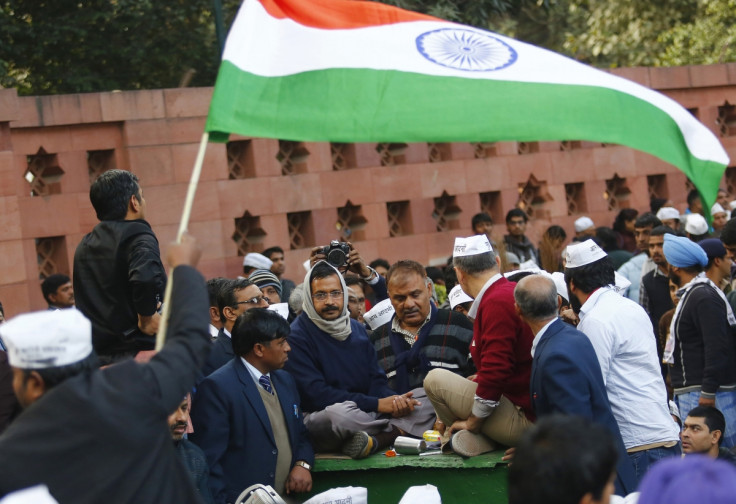India 'Racial Profiling': Vigilante Minister Leads Stick-Wielding Group to Home of African Woman in Dead of Night

Pressure is mounting on the law minister of New Delhi to resign after a Ugandan woman said he had led a group of people that ransacked her house at midnight accusing her and others of drug peddling and prostitution.
Somnath Bharti, a greenhorn minister in the Arvind Kejriwal-led government in the national capital territory, which is barely three weeks old, had allegedly raided the south Delhi house in which the African woman lived and asked the police to carry out searches in all African residences in the area.
"We were attacked on Wednesday (15 January) night by Indians who were led by Somnath Bharti ... We were harassed, we were beaten, they were having long sticks. They said we should leave their country or else they would kill us one by one," the Ugandan national said in a statement to the police.
The woman said she identified Bharti as the leader of the group after she saw the minister on television. "... He came in the night and the next day I saw him on television. The Delhi police came in time and saved us from the mob," she said.
Women's organisations in the Indian capital have called for the ouster of the minister, who they said breached the law by racially profiling foreign women and instigating the mob to stage an attack that would have compromised their safety.
Bharti had insisted he conducted the raid after receiving information about a prostitution and drugs racket in the area.
Radical party's challenge
The incident had escalated after the police officers refused to obey the orders of the minister to raid the houses of all Africans in the Khirki Extension area, citing the need for a warrant.
The Delhi government demanded the federal administration to sack the policemen, but the centre's refusal led to the unprecedented situation of the chief minister stalling normal life in the city by staging day-night siege of a government building.
Kejriwal's young political outfit, the Aam Addmi Party (AAP) or the Common Man's Party, is a cluster of radicals who cashed in on the frustration of urban masses with mainstream political parties to ride a popularity wave unseen in Indian history.
"Without any other evidence, can women be forced to undergo drug tests only because of their race and nationality? The drug tests and cavity searches to which these women were subjected, turned up negative: when do you plan to apologise to them for the false allegation and the indignity, not to mention the groping they suffered at the hands of your minister's supporters?"
However, the siege of the Rail Bhavan, or railway headquarters, in the capital and the city-wide protest of party workers eroded maverick Kejriwal's popularity to some extent as critics said he was a chief anarchist, not the chief minister.
He then sought peace with the federal government and withdrew from the protest.
However, the revelations of the Ugandan woman have posed key questions about the way in which the young administration is dealing with issues of sensitive nature.
In an open letter to Kejriwal, several prominent women activists said the minister's action was shocking and unacceptable and that he had "endangered those African women by calling upon a mob to go chase them and catch them".
"Without any other evidence, can women be forced to undergo drug tests only because of their race and nationality? The drug tests and cavity searches to which these women were subjected, turned up negative: when do you plan to apologise to them for the false allegation and the indignity, not to mention the groping they suffered at the hands of your minister's supporters?," the letter said.
Kejriwal had defended Bharti's actions and the party insisted what the minister did was right.
"I don't think Somnath Bharti made racist comments ... I don't consider Somanth Bharti an embarrassment to the party," Kejriwal told NDTV.
"Somnath Bharti is being made a political target. If he is found guilty, then AAP will take necessary action against him," said a party spokesperson.
Bharti had earlier landed in soup after upbraiding his secretary for not calling the meeting of all judges of the Delhi High Court, power the minister does not have.
Facing condemnation after last week's raid, Bharti had said he decided to take action as he got complaints from the women in the locality that Nigerian and Ugandan nationals were involved in drug and sex racket.
Midnight attack
Eyewitnesses said Bharti and the party workers tried to enter a house from where, they accused, a drug and prostitution ring was run.
"We were in our house when suddenly we heard people shouting outside. When we peeped out, we saw a huge crowd. We got scared and locked ourselves inside," said a young woman who calls herself Sandra, according to the Hindustan Times.
The 24-year-old said she is pursuing a course in the Indira Gandhi National Open University in the capital.
"They hurled abuses and insulted us ... We were taken to the hospital and later allowed to return home. We thought the crowd will kill us. We were very scared," Sandra and her friend said, according to the report.
However, the newspaper also reported that most of the local residents were "happy" about the vigil and extreme action taken by the minister. While decrying racial profiling, the residents said they were uneasy and alarmed about the presence of large numbers of Africans in the area, the paper said.
"This is not racism. At night, I often find the Africans standing there, taking drugs and looking for buyers. Foreign women keep standing everywhere. They are prostitutes," it quoted a resident as saying.
© Copyright IBTimes 2024. All rights reserved.






